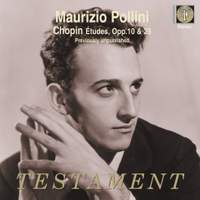Recording of the Week,
Maurizio Pollini plays Chopin
“That boy plays better than any of us jurors”. These were the words of Arthur Rubinstein, chairman of the jury at the sixth International Chopin Competition in 1960, referring to the young pianist, Maurizio Pollini, who had just been awarded first prize. As a result of his success at the competition, Pollini was immediately signed up to a recording contract by EMI, and the initial disc resulting from this was a recording of the first Chopin concerto, still rightly regarded as a classic. As a follow-up, EMI planned for Pollini to record the two sets of Chopin Études (opp. 10 and 25). After the sessions, though, and without giving any specific reason, Pollini refused to give his approval for the recording to be issued, and so they languished unreleased in the EMI archive. However, although Pollini seems not to have actually changed his mind on his original decision, the copyright on recordings expires after fifty years, and so now we are able to hear this version courtesy of the Testament label. His later recording of the Études on Deutsche Grammophon is a sensational disc in its own right, and so you might think that if you already have that recording, there would be no need to get this disc as well, but this earlier account is a quite extraordinarily revelatory experience.

Recorded when he was just eighteen years old, this exceptional recording has such a clarity and a feeling of freshness about it. Tempos between the two versions are on the whole pretty similar, although the 1960 opp. 25/7 and 10/3 are slightly more expansive than in 1972, and op. 10/6 is one whole minute longer, but it never drags or feels plodding. Pollini’s use of rubato is quite superb, particularly in the E major op.10/3, where there is a freedom of phrasing that makes the later recording seem strait-laced by comparison. Use of the pedal is relatively sparing throughout, which means that textures are transparent and never muddy (in this respect I was reminded of his tremendous recording from last year of Book One of Bach’s Well-Tempered Clavier, where you could really hear every single fugal entry, even in the densest of textures). The acoustic also seems to me to be slightly drier, and less closely-miked, and as such may lack that immediately vibrant brilliance that the later DG version possesses, but for a recording that is fifty years old, one can’t really complain too much! Quite why Pollini didn’t want this recording to be released is a bit of a mystery, but I must say I’m very glad that Testament has issued it, and I would go as far as to say that in many ways I actually prefer it to the DG recording.
After one more recording for EMI, Pollini was successfully poached by Deutsche Grammophon, with whom he has remained ever since. Next year will be his seventieth birthday, and to celebrate this, DG has released two boxes of previously-available recordings: a Chopin box, and a collection of music by twentieth-century composers. The Chopin collection includes all of the recordings he has made for DG, and while he has not quite covered the complete solo piano music of Chopin, most of the major works are present (the only considerable holes are perhaps the first sonata, and most of the mazurkas). Again, his deft touch and control of structure are evident throughout, whether it be the dazzlingly virtuosic performances of the Scherzi, or the beautifully expressive melodies in the Nocturnes.
Pollini has always been an ardent advocate of contemporary music, and indeed his first recording for DG paired Stravinsky’s Three Movements from Petrushka with Prokofiev’s Seventh Piano Sonata. What a debut that was: I don’t think I’ve ever heard a more stunning display of masterly pianism at work than the opening movement of Petrushka, and he despatches the phenomenally difficult final Precipitato 7/8 movement of the Prokofiev with such consummate ease that one is left open-mouthed in astonishment! The box also contains, amongst other things, discs of music by Arnold Schoenberg and Luigi Nono, and while such music may not be at the top of everyone’s playlists, they are extremely persuasive interpretations, and may even convert a few listeners who previously found the music impenetrable! The thirty-minute piece by Nono for soprano, piano and orchestra, Como una ola de fuerza y luz, is especially tough listening, but is well worth the effort, and listened to alongside the Chopin recordings, shows Pollini’s incredible range and versatility. Happy seventieth birthday, Maurizio!
Maurizio Pollini (piano)
Available Format: Vinyl Record
Maurizio Pollini (piano)
Available Formats: MP3, FLAC
Maurizio Pollini (piano)
Available Formats: MP3, FLAC





